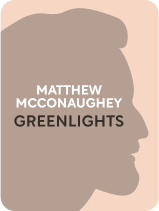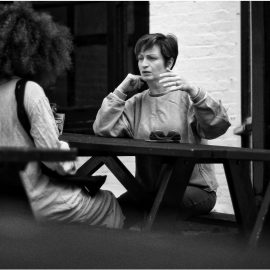

This article is an excerpt from the Shortform book guide to "Greenlights" by Matthew McConaughey. Shortform has the world's best summaries and analyses of books you should be reading.
Like this article? Sign up for a free trial here .
Are you looking for Greenlights book club questions? What kinds of lessons are in the book, and how can they apply to your own life?
These Greenlights book club questions cover some of the major lessons in the book that McConaughey discusses. From the psychological to the spiritual, these topics can help you see your own life and your greenlights clearly.
Keep reading for 25+ thought-provoking Greenlights book club questions.
25+ Greenlights Book Club Questions
These Greenlights book club questions are sorted by category based on Matthew McConaughey’s life lessons. Think about how you’d respond to different situations in life, and how you can grow spiritually and individually.
Consider Your Inherited Structure
In Part 1, Matthew describes some of the life experiences that taught him to honor structure if you want to be free. This exercise leads you to reflect on your own inherited structures and the ways you can honor them.
What are some of the “structures” you inherited from your childhood, whether values, habits of mind, or codes of conduct? How did your upbringing teach you to think, talk, and live?
How has your life reflected the influence of these structures?
How can you best honor your inherited structures to find more freedom? (What traditions could you keep? What values or habits could you maintain?) On the flipside, how would refusing to honor these impair your freedom? (What inner or outer conflicts or confusions might you encounter by totally abandoning your past?)
Find Your Frequency
As a high school senior and then an exchange student, Matthew found that you can discover your frequency (learn who you are) by learning who you aren’t and getting rid of things that aren’t right for you. This exercise helps you to begin the process of sorting these things out in your own life.
Recount a situation where you were asked or pressured to do something that you knew was wrong for you
How did you respond? If you gave in, how did that make you feel? If you successfully resisted, how did that make you feel?
If you weren’t happy with your response to the situation, what lessons did you learn that you can apply to a similar situation in the future? If you were happy with your response, why?
How did your response reflect your sense of identity?
Become More Involved With Your Life
The loss of Matthew’s father made him realize that he needed to lose his childhood view of being “impressed” by life and assume the adult responsibility of being more involved with it. This exercise will help you explore this principle in your own experience.
What are some of the iconic presences in your life, the figures of “mythic” stature? Your parents? Your religion? Your job?
Consider the impact of losing one of these things. How would such a loss affect your thoughts, emotions, and worldview? (If you’ve actually experienced such a loss, how did it affect you?)
What gift might lie on the other side of such a loss for you? How might this lead to your becoming a more fully functional adult? Greater freedom? A new sense of worthy obligations to fulfill?
Find Your Freedom
Matthew learned a hard lesson about the importance of balancing freedom with preparation. This exercise will help you to learn more about the balance of these intertwined principles in your own life.
Some people place too much emphasis on preparation and control. Others place too much emphasis on freedom and spontaneity. Which one are you?
Whichever side of this divide you fall on, why do you think that’s your comfort zone? What is it about the other approach that seems foreign or frightening to you?
What would it look like for you to achieve a better balance between your comfort zone and its opposite? What’s one specific action that you could take this week to begin building that better balance?
Turn the Page of Your Life
Matthew writes about the idea of “turning the page” of your life when you need a significant change. This exercise will help you to reflect on this idea and apply it to your life.
We’ve all gone through page-turning transitions in our lives, times when everything changed dramatically. What was one of yours?
Did you choose to turn the page, or did it feel like it was turned for you, by forces outside your control?
What points of life transition can you see in your experience right now and/or in the future? (What page will you need to turn?)
What can you start doing right now to increase your voluntary participation in these transitions? How can you train yourself and position yourself to choose when and how you’ll turn the pages of your life instead of having them turned for you?
Practice Being a Genius
What are the major obligations that fill up your life right now? What people, organizations, and activities claim the majority of your time, energy, and attention?
In your heart of hearts, what’s the most important claim on your life at this moment? For Matthew when he learned Camila was pregnant, it was his family. What is it for you—a person, a project? Name only one or two things.
Which of your obligations could you let go of? Which don’t support your most important priorities?
Define Your Success
What are some of the real successes you’ve achieved in life? Focus not on outward acclaim but your inward sense of happiness and accomplishment. What have you done that has made you feel like you really accomplished something worthwhile? (If possible, name several things.)
Think about the general principle behind all of your successes. What do they point toward? Beyond the specifics, what does success mean to you, personally? Write it out directly: “To me, success means..,”
In what ways have other people tried to define success for you? What are some roles, projects, or goals that others have wanted you to pursue, but that didn’t feel meaningful to you?
What can you do this week to act on your principles and make progress toward more success in your life
Map Your Life
Matthew’s concept of living wisely by beginning with the end (your death) in mind can serve as a focusing tool for planning what you want to accomplish. This exercise guides you through applying it.
How do you want to be remembered? What do you want your eventual eulogy to say?
Right now, how far is your life from the description in that eulogy? What accomplishments, character qualities, or other things in that eulogy are not present or not fully developed in your current life?
How can you “close the gap”? What things need to happen, and what things do you need to do, for you to become the person described in that eulogy?
Get very specific: What actions can you take this week, this month, today, to begin shaping the story of your life so that when you die, you will have lived well and been successful (in the deepest meaning of that word for you)

———End of Preview———
Like what you just read? Read the rest of the world's best book summary and analysis of Matthew McConaughey's "Greenlights" at Shortform .
Here's what you'll find in our full Greenlights summary :
- How "greenlights" help you confirm if you're on the right path
- How McConaughey switched college choices because of family finances
- Why family is at the center of everything for McConaughey, no matter what's happening in his career






